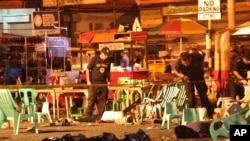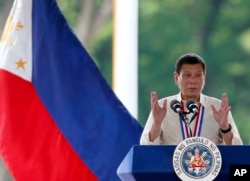An apparent terrorist attack in Philippine President Rodrigo Duterte’s hometown, which is normally known for its public safety, will escalate the government’s battle with violent Muslim rebels and could change the course of decades of civil conflict.
Terrorist group Abu Sayyaf has taken credit for a bombing late Friday at a night market in Davao that killed 14 people and injured 70, according to Philippine news reports. Some reports say the group retracted its statement.
The bombing is the first major retaliation after Duterte – known as a crime fighter unafraid of using extrajudicial violence -- took office June 30 and began strikes against Abu Sayyaf in its stronghold near the southern island Mindanao. Those attacks killed 12 troops and 22 rebels last month. The same group is known for kidnapping foreigners, including a Canadian national who was beheaded in April.
Duterte, a tough-talking former mayor of Davao, pledged last month to wipe out Abu Sayyaf, which has an estimated 400 members. He is also preparing to reopen peace talks with another Muslim rebel group, the Moro Islamic Liberation Front.
That two-prong approach to the rebels would match a campaign promise to rein-in a decades-old violent insurgency in Mindanao, the Philippine’s southernmost major island and the location of Davao.
But analysts caution that the effort will just trigger more violence without political solutions to the underlying problems.
“The peace talks, a focus on education, [people’s] livelihood, corruption eradication and addressing the history of Muslims and the land they own, all of these are the root causes of these bad events,” said Eric Su, social networking company CEO in Davao. “Hopefully as we do more good in these areas, the likelihood of terrorist attacks will go down.”
At least four Muslim groups that trace their roots to nearby Malaysia have vied since the 1960s for autonomy and control of resources in Mindanao, which is poorer than most of the rest of the Philippines, partly because conflicts there have set back economic development.
Duterte declared a state of lawlessness Saturday, allowing more coordination between police and troops in the fight against Abu Sayyaf after the night market bombing. His talks with the Moro Islamic Liberation Front could extend a peace and autonomy-sharing deal that the Muslim group signed with the government in 2014, but which still lacks follow-up legislation in Manila.
The president needs a mix of suppression and broader problem solving to fix the broader Mindanao issue said Tim Johnston, Asia program director with the International Crisis Group. Otherwise, he said, the eradication of Abu Sayyaf could create new armed resistance.
“A suppressive element is probably necessary, but it needs to be embedded in a broader political solution,” Johnston said. “These two are not incompatible. They are complementary in many ways.”
But analysts fear the Davao bombing, if it was conducted by Abu Sayyaf, shows that group’s resolve to fight back and signals more violence.
“Violence begets violence, and so I think it’s going to become a real challenge for [Duterte] to see how long he can continue this campaign of violence against the drug traffickers and now against the Abu Sayyaf without upsetting both the economic and the political stability in the country,” said Carl Baker, director of programs with the CSIS Pacific Forum think tank in the United States.
Johnston noted previous Philippine presidents have been unable to rein the group in.





